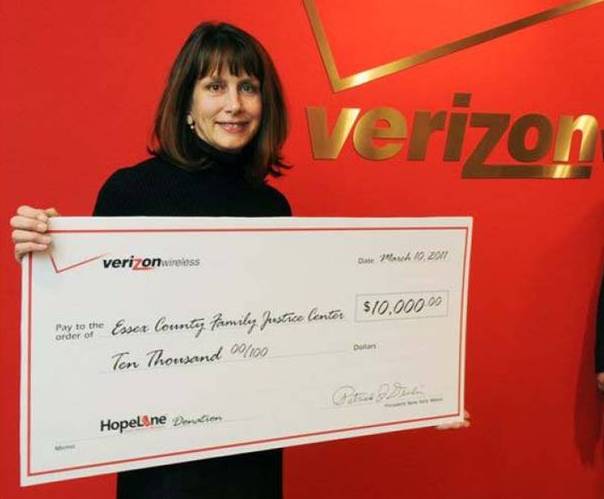Verizon Communications branded as Verizon an American broadband and telecommunications company and a corporate component of the Dow Jones Industrial Average. The company is based in New York City at 1095 Avenue of the Americas but and incorporated in Delaware.
What eventually became Verizon was founded as Bell Atlantic, which was one of the seven Baby Bells that were formed after AT&T Corporation was forced to relinquish its control of the Bell System by order of the Justice Department of the United States. Bell Atlantic came into existence in 1984 with a footprint from New Jersey to Virginia, with each area having a separate operating company.
As part of the rebranding that the Baby Bells took in the mid-1990s, all of the operating companies assumed the Bell Atlantic name. In 1997, Bell Atlantic expanded into New York and the New England states by merging with fellow Baby Bell NYNEX. In addition, Bell Atlantic moved their headquarters from Philadelphia into the old NYNEX headquarters and rebranded the entire company as Bell Atlantic.
In 2000 Bell Atlantic merged with GTE, which operated telecommunications companies across most of the rest of the country that was not already in Bell Atlantic’s footprint. The combined company elected to change its name to “Verizon”, a portmanteau of veritas (Latin for “truth”) and horizon. The first New York City company headquarters was at 1095 Avenue of the Americas (1997-2000) until the Bell Atlantic-GTE merger, when the headquarters moved to the Verizon Building at 140 West Street in Lower Manhattan, before returning to the 1095 space in 2013.
Verizon Communications formed in June 2000 when the Federal Communications Commission approved a US$64.7 billion merger of telephone companiesBell Atlantic and GTE, nearly two years after the businesses proposed the deal in July 1998. The approval came with 25 stipulations to preserve competition between local phone carriers, including investing in new markets and broadband technologies. The new venture was headed by co-CEOs Charles Lee, formerly the CEO of GTE, and Bell Atlantic CEO Ivan Seidenberg.
Upon its inception, Verizon became the largest local telephone company in the United States, operating 63 million telephone lines in 40 states. The company also inherited 25 million mobile phone customers. Additionally, Verizon offered Internet services and long-distance calling in New York, before expanding long-distance operations to other states.
The name Verizon derives from the combination of the words veritas, Latin for truth, and horizon. The name was chosen from 8,500 candidates and the company spent $300 million on marketing the new brand.
Two months before the FCC gave final approval on the formation of Verizon Communications, Bell Atlantic formed Verizon Wireless in a joint venture with the British telecommunications company Vodafone in April 2000. The companies established Verizon Wireless as its own business operated by Bell Atlantic, which owned 55% of the venture. Vodafone retained 45% of the company. The deal was valued at approximately $70 billion and created a mobile carrier with 23 million customers. Verizon Wireless merged Bell Atlantic’s wireless network, Vodafone’s AirTouch and PrimeCo holdings, and the wireless division of GTE. Due to its size, Verizon Wireless was able to offer national coverage at competitive rates, giving it an advantage over regional providers typical of the time.
On December 22, 2004, mail servers at Verizon.net were configured not to accept connections from Europe, by default, in an attempt to reduce spam email that was originating from the region. Individual domains would only be unblocked upon request.
Verizon launched its FiOS Internet service, which transmits data over fiber optic cables in Keller, Texas. The company launched FiOS TV in September 2005, also in Keller, Texas. Twenty percent of qualified homes signed up by the end of the year. By January 2006, FiOS offered over 350 channels in eight states, including 20 high-definition television channels as well as video on demand.
Verizon began negotiations to purchase long distance carrier MCI in 2005. MCI accepted the company’s initial $6.75 billion offer in February 2005, but then received a higher offer from Qwest Communications. Verizon increased its bid to $7.6 billion (or $23.50 a share), which MCI accepted on March 29, 2005. The acquisition gave the company access to MCI’s one million corporate clients and international holdings, expanding Verizon’s presence into global markets. As a result, Verizon Business was established as a new division to serve the company’s business and government customers. The FCC approved deal on November 5, 2005, valuing it at $8.5 billion. Verizon’s 2006 revenues rose by as much as 20% following the purchase.
In May 2006, USA Today reported that Verizon, as well as AT&T and BellSouth, had given the National Security Agencylandline phone records following the September 11 attacks. That same month, a $50 billion lawsuit was filed by two lawyers on behalf of all Verizon subscribers for privacy violations and to prevent the company from releasing additional records without consent or warrant. Protesters staged the National Day of Out(R)age due in part to the controversy. Verizon stated in 2007 that the company fulfilled only “lawful demands” for information, though also acknowledged surrendering customer information to government agencies without court orders or warrants 720 times between 2005 and 2007.
In November 2007, Verizon opened its networks for the first time to third party apps and devices, a decision that allowed it to participate in the FCC’s 2008 700 MHz auction of “open access” spectrum. During that auction, the company bid $9.4 billion and won the bulk of national and local licenses for airwaves reaching approximately 469 million people. Verizon utilized the increased spectrum for its 4G service.
Verizon introduced its 4GLTE network in 38 markets in December 2010, as well as in airports in seven additional cities. The company planned on a three-year continuous expansion of the 4G service.
On January 27, 2011, Verizon acquired Terremark, an information technology services company for $1.4 billion. In February 2011, Verizon Wireless began selling the iPhone 4, which eventually became the most successful launch on the network, outselling all previous phones in the company’s history. Ivan Seidenberg stepped down as Verizon’s CEO on August 1, 2011. Lowell McAdam succeeded him.
In December 2011, the non-partisan organization Public Campaign criticized Verizon for its tax avoidance procedures after it spent $52.34 million on lobbying while collecting $951 million in tax rebates between 2008 and 2010 and making a profit of $32.5 billion. The same report also criticized Verizon for increasing executive pay by 167% in 2010 for its top five executives while laying off 21,308 workers between 2008 and 2010. However, in its Form 10-K filed with the SEC on February 24, 2012, Verizon reported having paid more than $11.1 billion in taxes (including income, employment and property taxes) from 2009 to 2011. In addition, the company reported in the 10-K that most of the drop in employment since 2008 was due to a voluntary retirement offer.
Also in June 2012, Verizon’s E-911 service failed in the aftermath of the June 2012 derecho storm in several northern Virginia suburbs of Washington, D.C., with some problems lasting several days. The FCC conducted an investigation and in January 2013 released a report detailing the problems that led to the failure. Verizon reported that it had already addressed or was addressing a number of the issues related to the FCC report, including the causes of generator failures, conducting audits of backup systems and making its monitoring systems less centralized, although the FCC indicated that Verizon still needed to make additional improvements.
In August 2012, the Department of Justice approved Verizon’s purchase of Advanced Wireless Services (AWS) spectrum from a consortium of cable companies, including Comcast, Time Warner Cable and Bright House Networks, for $3.9 billion. Verizon began expanding its LTE network utilizing these extra airwaves in October 2013.
On June 5, 2013, The Guardian reported it had obtained an order by the Federal Bureau of Investigation (FBI) and approved by the United States Foreign Intelligence Surveillance Court that required Verizon to provide the NSA with telephone metadata for all calls originating in the U.S. Verizon Wireless was not part of the NSA data collection for wireless accounts due to foreign ownership issues.
January 14, 2014, the DC Circuit Court of Appeals struck down the FCC’s net neutrality rules after Verizon filed suit against them in January 2010. On January 22, 2014 the Wall Street Journal reported that Verizon Communications Inc. received more than 1,000 requests for information about its subscribers on national security grounds via National Security Letters. In total, Verizon received 321,545 requests from federal, state and local law enforcement for U.S. customer information.
Verizon donates to 501C3. Verizons Matching Gifts Program provides opportunities for employees and retirees to have their donations to eligible nonprofit organizations, schools, and accredited colleges and universities matched by the Verizon Foundation.
Matching Gifts: 1:1 match up to $1,000 per year, per donor,
Matching Gifts – Higher Education: 1:1 match up to $5,000 per year, per donor.
Eligible Organizations:
- U.S.: Most U.S. based 501(C)(3) organizations, U.S. public and private schools and U.S. accredited colleges and universities. Non U.S. organizations and schools that have been pre-approved and vetted for inclusion in the Matching Gifts Program.
- APAC, Canada, EMEA, LATAM: Click here for the organizations list
- Active full-time and part-time employees are eligible; retirees are eligible for Higher Education match only.
- Donor must be an active full-time or part-time employee or retiree when donation is made and matching gift request is submitted online with the Verizon Foundation.
- Donations must be a personal financial contribution of $25 or more from the donor’s own assets and paid directly to an eligible 501(C)(3)organization, U.S. public or educational institution, a U.S. based accredited college or university or an eligible APAC, Canada, EMEA or LATAM organization.
Donations must be in one of the following forms: personal check/cheque, money order, credit card payment, transfer of stock certificate.
Donor is not permitted to request a matching gift on behalf of a charitable organization or educational institution if they are a founder or employee of that organization or educational institution.
Matching Gift funds may not be used to provide any direct or indirect financial benefit to the employee, employee’s family member* or any person with whom the employee shares a close personal relationship** (i.e., matching gifts may not be used to pay a salary, fulfill membership dues or registration fees, or satisfy a personal pledge, etc.).
Team pledges are not eligible for matching via the Matching Gifts Program.
Submitting your matching gift request: 2014 matching gift requests must be submitted online by Jan. 31, 2015, Employees must register their own donations and submit their own grant requests.
Confirmation:
A representative of the charitable organization or educational institution is required to confirm receipt of your donation on line. The following are individuals are NOT permitted to confirm on behalf of the organization or educational institution:
- The employee
- A member of the employee’s family*
- Someone with whom the employee shares close personal relationship**
- Any Verizon employee
2014 Matching gift requests must be confirmed by March 31, 2015.
Matching Gift Payout:
- The Verizon Foundation will not consider a Matching Gift to be eligible for payout if there is any discrepancy between the donation amount entered by the donor and the donation amount confirmed by the organization or educational institution.
- Matching Gifts are reviewed and paid on a quarterly basis; checks are mailed directly to the charitable organization or educational institution.
- The donor will receive an email notifying them that their donation has been processed and matched by the Verizon Foundation.
Family Member includes members of the employee’s immediate and extended family. (Immediate and extended family includes, but is not limited to, one’s spouse, domestic partner, parents, brothers, sisters, children, grandparents, grandchildren, cousins, in-laws, aunts, uncles, nieces, nephews or any similar half or step-relationship.)
**Close Personal Relationship refers to anyone in your family or household, someone with whom you have, or had, a romantic relationship or other close personal relationship.
The Verizon Foundation cannot process any gift where there is a discrepancy between the gift amount entered by the donor and the amount confirmed by the nonprofit.
Please be sure to abide by all Matching Gifts Program rules.
Only those application that adhere to the rules will be considered for approval and payout. All Matching Gift requests are subject to review by Verizon Internal Audit and Verizon Security.
As stated in the code of Conduct, Verizon does not tolerate falsification or improper alteration of records. Failure to comply with any provision of the Code or company policy is a serious violation, and may result in disciplinary action, up to and including termination of employment.
Eligibility, terms, and conditions of the program are subject to change at any time. If you have any questions regarding these terms and how they apply to you or your gift please call contact us at vznmail@cybergrants.com or if you are in the US , you can call us at 866-247-2687 Monday – Friday from 8 a.m. – 8 p.m. EST and we will be happy to review them with you.


